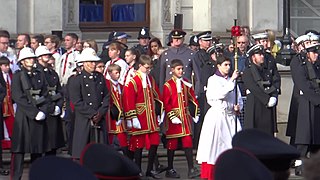Related Research Articles
The King's Men was the acting company to which William Shakespeare (1564–1616) belonged for most of his career. Formerly known as the Lord Chamberlain's Men during the reign of Queen Elizabeth I, they became the King's Men in 1603 when King James I ascended the throne and became the company's patron.
John Heminges was an actor in the King's Men, the playing company for which William Shakespeare wrote. Along with Henry Condell, he was an editor of the First Folio, the collected plays of Shakespeare, published in 1623. He was also the financial manager for the King's Men.
Henry Condell was a British actor in the King's Men, the playing company for which William Shakespeare wrote. With John Heminges, he was instrumental in preparing and editing the First Folio, the collected plays of Shakespeare, published in 1623.

Sejanus His Fall, a 1603 play by Ben Jonson, is a tragedy about Lucius Aelius Sejanus, the favourite of the Roman emperor Tiberius.
Robert Johnson was an English composer and lutenist of the late Tudor and early Jacobean eras. He is sometimes called "Robert Johnson II" to distinguish him from an earlier Scottish composer. Johnson worked with William Shakespeare providing music for some of his later plays.

John Lowin was an English actor.

A boy player was a male child or teenager who performed in Medieval and English Renaissance playing companies. Some boy players worked for adult companies and performed the female roles, since women were not allowed to perform on the English stage during this period. Others worked for children's companies in which all roles, not just the female ones, were played by boys.
Alexander Cooke was an actor in the King's Men and the Lord Chamberlain's Men, the acting companies of William Shakespeare, John Heminges and Richard Burbage.

The Children of the Chapel are the boys with unbroken voices, choristers, who form part of the Chapel Royal, the body of singers and priests serving the spiritual needs of their sovereign wherever they were called upon to do so. They were overseen by the Master of the Children of the Chapel Royal.
Thomas Pope, also credited as Thomas Poope in the First Folio, was an Elizabethan actor, a member of the Lord Chamberlain's Men and a colleague of William Shakespeare. Pope was a "comedian and acrobat."
Joseph Taylor was a 17th-century English actor. As the successor of Richard Burbage as the leading actor with the King's Men, he was arguably the most important actor in the later Jacobean and the Caroline eras.
Richard Robinson was an actor in English Renaissance theatre and a member of Shakespeare's company the King's Men.
Catiline His Conspiracy is a Jacobean tragedy written by Ben Jonson. It is one of the two Roman tragedies that Jonson hoped would cement his dramatic achievement and reputation, the other being Sejanus His Fall (1603).
William Ecclestone or Egglestone was an actor in English Renaissance theatre, a member of Shakespeare's company the King's Men.
Robert Benfield was a seventeenth-century actor, noted for his longtime membership in the King's Men in the years and decades after William Shakespeare's retirement and death.
Eliard Swanston, alternatively spelled Heliard, Hilliard, Elyard, Ellyardt, Ellyaerdt, and Eyloerdt, was an English actor in the Caroline era. He became a leading man in the King's Men, the company of William Shakespeare and Richard Burbage, in the final phase of its existence.
John Shank was an actor in English Renaissance theatre, a leading comedian in the King's Men during the 1620s and 1630s.
John Underwood was an early 17th-century actor, a member of the King's Men, the theatrics company of William Shakespeare.
King's Men personnel were the people who worked with and for the Lord Chamberlain's Men and the King's Men from 1594 to 1642. The company was the major theatrical enterprise of its era and featured some of the leading actors of their generation – Richard Burbage, John Lowin, and Joseph Taylor among other – and some leading clowns and comedians, like Will Kempe and Robert Armin. The company benefitted from the services of William Shakespeare, John Fletcher, and Philip Massinger as regular dramatists.
William Heminges, also Hemminges, Heminge, and other variants, was a playwright and theatrical figure of the Caroline period. He was the ninth child and third son of John Heminges, the actor and colleague of William Shakespeare, and his wife Rebecca.
References
- ↑ E. K. Chambers, The Elizabethan Stage, 4 Volumes, Oxford, Clarendon Press, 1923; Vol. 2, p. 331.
- ↑ F. E. Halliday, A Shakespeare Companion 1564–1964, Baltimore, Penguin, 1964; p. 346.
- ↑ Chambers, Vol. 2, p. 322.